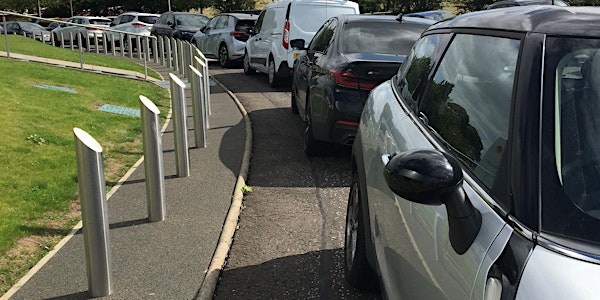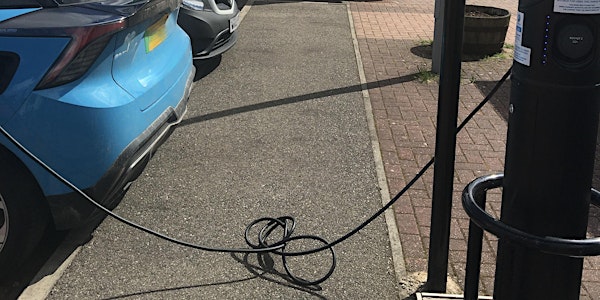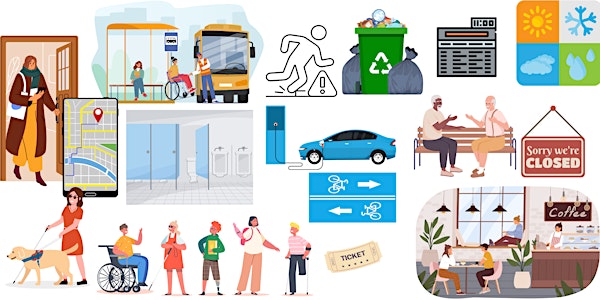


THINK Workshop: A Just Transition or Just a Transition?
Turn expertise & experience we have into actionable plans for incorporating design for inclusion into emerging plans for decarbonisation.
Date and time
Location
Online
About this event
If all the vehicles parked on the pavement in the image above are 100% electric, is this an example of a Just Transition or just a transition? To borrow from Buckminster Fuller, we can’t decarbonise our transport fairly using our current approach, we need to build alternatives to our existing model. Join us to help shape a possible approach that can a lower the impact of travel on people as well as the planet.
Efforts to make travel more equitable aren't working, which doesn't bode well for achieving a Just Transition. Despite decades of research, strategies and campaigns for more inclusive mobility, progress has been described as 'slow and piecemeal' and in a recent Transport for All report, disabled people described the impact of this injustice as being 'felt in every corner of our lives'.
And now we're redesigning to rapidly decarbonise transport networks. If today's new vehicles and travel environments continue to disable and disadvantage, when will that transition start to become Just ? When will we begin taking this one-time opportunity to simultaneously and intentionally design for inclusion as well as decarbonisation?
Andy Hyde brings people who are disabled by our transport networks together with those who design and provide our services. In this workshop, Andy will consider what might be stopping us from creating more inclusive services and suggest some ideas that could turn the expertise and experience that we already have into immediately actionable plans for incorporating design for inclusion (designing for people) into emerging plans for decarbonisation (designing for the planet).
“The challenge is to avoid being trapped by the present – which requires finding a method, a space, or a point of leverage, with which to think thoughts that don’t yet exist” Geoff Mulgan
Andy will share some ideas for a new approach that uses a new language of mobility and considers our journeys as a system, a combination of experiences beyond transport. We'll then work together in groups, exploring a process that could help align and combine efforts to improve inclusion with plans for decarbonisation. It's not claiming to be the answer, but it's a start.
This will be a participative, conversational event. If you play a role in making journeys happen, join us to meet with colleagues from transport, health, academia, policy and third sector along with people who have experience of exclusion and disadvantage when they travel.
Join us for a rare opportunity to use our imagination, create alternative visions of more inclusive and low carbon journeys of the future and shape ideas for a new way of working together.
CYMRAEG
Pontio teg neu bontio a dim mwy? Cyd-ddychmygu i sicrhau ein bod yn creu dyfodol carbon isel teg.
Petai’r holl gerbydau sydd wedi'u parcio ar y palmant yn y ddelwedd uchod yn gerbydau trydan 100%, a fyddai hyn yn enghraifft o Bontio Teg neu’n bontio a dim pellach? I fenthyg oddi wrth Buckminster Fuller, ni allwn ddefnyddio ein dull presennol i ddatgarboneiddio ein trafnidiaeth yn deg, mae angen i ni greu dewisiadau sy’n wahanol i'n model presennol. Ymunwch â ni i helpu i lunio dull gweithredu posibl a all leihau effaith teithio ar bobl yn ogystal â'r blaned.
Nid yw’r ymdrechion i wneud teithio'n fwy teg yn llwyddo ac nid yw hyn yn argoeli'n dda i gyflawni’r Pontio Teg tuag at deithio carbon isel. Er gwaethaf degawdau o ymchwil, strategaethau ac ymgyrchu am deithio mwy cynhwysol, mae’r cynnydd wedi’i ddisgrifio fel 'araf a thameidiog' ac mewn adroddiad diweddar, Trafnidiaeth i Bawb, disgrifiwyd effaith yr anghyfiawnder hwn gan pobl anabl gan ddweud ei fod yn cael ei 'deimlo ym mhob cornel o'n bywydau'.
Ac yn awr rydyn ni’n ailgynllunio i gyflym ddatgarboneiddio’r rhwydweithiau trafnidiaeth. Os yw’r cerbydau newydd a geir heddiw, ynghyd â’r amgylcheddau teithio newydd, yn parhau i beri anabledd ac anfantais, pa bryd fydd y newid hwnnw’n dechrau troi’n newid deg? Pryd fyddwn ni’n dechrau ar y Pontio Teg hwnnw? Pryd fyddwn ni’n dechrau cymryd yr unig gyfle hwn i gynllunio ar gyfer cynhwysiant, yn ogystal â datgarboneiddio, yn gydamserol ac yn fwriadol?
Mae Andy Hyde yn dod â phobl at ei gilydd – y rhai sydd yn profi anabledd oherwydd ein rhwydweithiau trafnidiaeth a’r rhai hynny sy’n dylunio ein gwasanaethau a’u darparu. Yn y gweithdy hwn, bydd Andy yn ystyried beth allai fod yn ein hatal rhag creu gwasanaethau sy’n fwy cynhwysol gan awgrymu rhai syniadau a allai droi’r arbenigedd a’r profiad sydd eisoes gennym yn gynlluniau y gellir eu gweithredu ar unwaith. Cynlluniau i ymgorffori dylunio cynhwysol (dylunio ar gyfer pobl) yn y cynlluniau i ddatgarboneiddio sy’n dod i’r amlwg (dylunio ar gyfer y blaned).
"Yr her yw osgoi cael eich caethiwo gan y presennol - sy'n gofyn am ddod o hyd i ddull, gofod, neu bwyntiau o ddylanwad, er mwyn gallu meddwl meddyliau nad ydynt yn bodoli eto" Geoff Mulgan
Bydd Andy yn rhannu rhai syniadau ar ddull newydd sy'n defnyddio iaith newydd ar gyfer teithio ac yn ystyried ein teithiau fel system, casgliad o brofiadau y tu hwnt i drafnidiaeth. Yna byddwn yn gweithio gyda'n gilydd mewn grwpiau, gan graffu ar broses a allai helpu i sicrhau bod ymdrechion i wella cynhwysiant yn cyd-fynd â chynlluniau i ddatgarboneiddio, ac yn cyfuno â hwy. Nid yw'n honni mai dyma'r ateb, ond mae'n ddechrau.
Bydd cyfle i gyfrannu a sgwrsio trwy gydol y digwyddiad hwn. Os ydych chi’n ymwneud a threfnu teithiau, ymunwch â ni i gwrdd â chydweithwyr o’r sector trafnidiaeth, iechyd, y byd academaidd, polisi a'r trydydd sector ynghyd â phobl sydd â phrofiad o gael eu heithrio ac o fod o dan anfantais wrth deithio.
Ymunwch â ni am gyfle prin i ddefnyddio ein dychymyg, creu gweledigaethau amgen o deithiau mwy cynhwysol a charbon isel yn y dyfodol a llunio syniadau ar gyfer ffordd newydd o gydweithio.
FAQs y Gymraeg https://think.aber.ac.uk/cy/newyddion
Frequently asked questions
Yes, there will be a break after 60 mins. Whilst the workshop will be interactive, you are welcome to turn your screen off and look away from the screen or get up and move around if you need to during the course of the workshop.
Yes, we will circulate the materials to all those who have signed up in advance of the workshop. If you have not received anything in the email you signed up with (it may have gone to your junk mail, so do check there first) before the 28th Feb, please email think@aber.ac.uk
Zoom - this platform's accessibilty features can be explored before the workshop via this link https://www.zoom.com/en/accessibility/ but if you want to test anything out with us before the event please email think@aber.ac.uk
No, we will have designated people to write things on a shared online document (using Miro and Google Docs) so that everyone's contributions are captured and seen by those in the workshop. Therefore all those taking part can just concentrate on coming up with great ideas!
Yes, we will put you into break out rooms and change those rooms around so that you get to meet different people in the workshop. We will also have a 'quiet space' break out room so you can remain in the main space if you need to take a break.
Yes, please email think@aber.ac.uk if this is something that you think will help you get the best from the workshop.
You can email Amy Nicholass, Project Officer for THINK and workshop coordinator at think@aber.ac.uk and you can call Amy within normal GMT working hours on Mondays, Wednesdays and Thursdays at +44 (0) 1970 628438
No, camera off is fine if that is your preference or you have band width issues, however others who require camera on to enable them to lip reader might benefit from cameras on when you are speaking if that is possible and you are comfortable with that, otherwise, use the chat function to contribute
Absolutely. Whilst Andy will be leading the workshop, Amy will be checking regularly on the chat function of Zoom to check for any questions, comments and emojis.